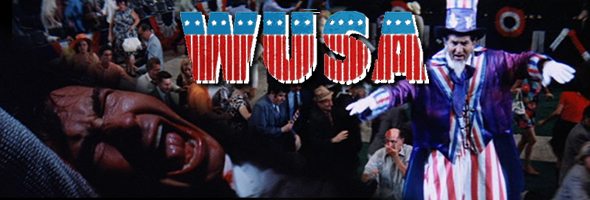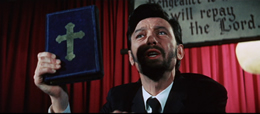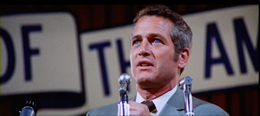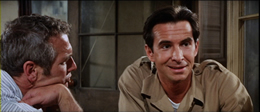


For anyone who thinks the modern media-encouraged culture wars are a relatively recent development, this blistering 1970 all-star offering provides eye-opening evidence that this scenario has been brewing for many decades -- and some even saw exactly where it was heading. Novelist Robert Stone (Who'll Stop the Rain) adapted his own novel, A Hall of Mirrors, for this project reuniting the Cool Hand Luke director/actor team of Stuart Rosenberg and Paul Newman, though the results proved to be far more unsettling and definitely less crowd-pleasing. 
Drifting failed musician Rheinhardt (Newman) heads into New Orleans to collect a debt from Farley (Harvey), a fire-and-brimstone evangelist, and decides to stick around after taking in a scarred prostitute, Geraldine (Woodward). His social worker neighbor, Rainey (Perkins), is a very passionate liberal, but the apathetic Rheinhardt decides to take a job as a DJ at an uber-conservative radio station. Despite having no extreme right-wing convictions, he goes along with the increasingly suspicious tactics of that station (run by Count Yorga, Vampire himself, Robert Quarry!), which comes to a head at a political rally with Rheinhardt as host and one pistol-packing, ostracized character taking extreme action.
Despite the openly left-wing sympathies of many cast members, WUSA doesn't exactly serve as much of an endorsement for either side. It's an extremely well-acted portrait of a country completely divided against itself, with citizens forced away  from any kind of moderate common ground just to make their voices heard. Newman is superb as usual (his disaffected, hard-drinking portrayal here at times feeling like a dry run for The Verdict), and Woodward, his wife and occasional co-star, matches him all the way to her poignant final scene. However, in many respects Perkins really steals the film with another of his stellar doomed outcast roles, sandwiched in between his more celebrated but thematically similar work in Pretty Poison and Play It as It Lays. Though the rest of the decade didn't really live up the promise of his early directing career, Rosenberg (who went on to direct The Amityville Horror) shows a fine sense for humid southern atmosphere and unique scope framing; in fact, it's tempting to wonder whether Robert Altman was a fan of this film, as Nashville in particular recalls not only the compositions and human patchwork quality of this film but its violent crowd assassination finale as well. On top of that, did you know Neil Diamond wrote and sang the song "Glory Road" originally for this movie?
from any kind of moderate common ground just to make their voices heard. Newman is superb as usual (his disaffected, hard-drinking portrayal here at times feeling like a dry run for The Verdict), and Woodward, his wife and occasional co-star, matches him all the way to her poignant final scene. However, in many respects Perkins really steals the film with another of his stellar doomed outcast roles, sandwiched in between his more celebrated but thematically similar work in Pretty Poison and Play It as It Lays. Though the rest of the decade didn't really live up the promise of his early directing career, Rosenberg (who went on to direct The Amityville Horror) shows a fine sense for humid southern atmosphere and unique scope framing; in fact, it's tempting to wonder whether Robert Altman was a fan of this film, as Nashville in particular recalls not only the compositions and human patchwork quality of this film but its violent crowd assassination finale as well. On top of that, did you know Neil Diamond wrote and sang the song "Glory Road" originally for this movie?
Despite its impressive pedigree, WUSA underperformed at the box office and essentially disappeared for decades, popping up only for very rare late-night TV airings to ambush unsuspecting viewers. Unfortunately its evocative visuals were severely compromised by a careless pan-and-scan transfer, but that was all anyone could have for many years. The first official home video release from Olive is a welcome development indeed as it not restores the original 2.35:1 framing but looks miles better as well, with a detailed, cinematic texture that suits it perfectly. Though the film runs just under two hours, it's also generously spread out onto a dual-layered disc and looks about as good as standard def would allow; ditto for the mono audio, which sounds terrific. The somber cover art might scare off some curious viewers, but if you love edgy '70s cinema, this is definitely worth a gamble.
![]()